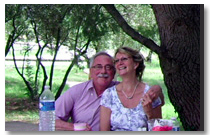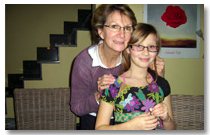AIRG Belgium: building hope
March 2011 Claude knew that he had a health problem – he would sometimes have blood in his urine – but had somehow learned to deal with it.
Claude knew that he had a health problem – he would sometimes have blood in his urine – but had somehow learned to deal with it.
When his daughter Muriel was born in 1972, he received terrible news: he and his newborn child had Alport syndrome, an inherited form of kidney inflammation (nephritis).
Muriel chose to have one child only and unfortunately her daughter Morgane has Alport too. “For years, we would look for information anywhere, everywhere and then when the French Association for Genetic Renal Diseases (AIRG-France) was created in 1988, we would go to their meetings and soak up all possible information!” says Paule Nyst, Claude’s wife. In 2007, the Belgium Association for Genetic Renal Diseases (AIRG-Belgium) was set up with 50 members, and now the patient organisation has 250 members! Paule is acting vice-president.
 Genetic renal diseases are severe diseases often leading to dialysis or transplant. Alport syndrome, CHARGE, Fabry, Joubert, Bardet Biedl are all genetic renal diseases. Paule Nyst has a very special role in AIRG. She is the one that answers the phone. “I have seen blood in my granddaughter’s urine and I know how it feels to be completely helpless, to be ignorant of rare diseases, to panic, to be sad, to be lonely and depressed when you receive a difficult diagnosis.”
Genetic renal diseases are severe diseases often leading to dialysis or transplant. Alport syndrome, CHARGE, Fabry, Joubert, Bardet Biedl are all genetic renal diseases. Paule Nyst has a very special role in AIRG. She is the one that answers the phone. “I have seen blood in my granddaughter’s urine and I know how it feels to be completely helpless, to be ignorant of rare diseases, to panic, to be sad, to be lonely and depressed when you receive a difficult diagnosis.”
Unfortunately, according to Paule Nyst, nephrologists are swamped with work. “They do their jobs well enough, but people come to us because we offer a friendly shoulder they can lean on. We give them information, they can come to our meetings to hear from other patients, hear their experiences, we give them lists of doctors they can go to,” says Paule Nyst. AIRG reaches out via leaflets and fact sheets. “People need to be able to find us at the doctor’s surgery, the hospital, the laboratory, at medical events such as the ’Kidney day’ and ‘Paediatrics Day’ fairs.”
AIRG Belgium held its third annual meeting last October. Workshops, lectures and conferences were held for some 130 people, most of them patients. One lecture by Michel Mercier, a psychologist working at Namur University in Belgium, was on “Rare diseases and resilience”. Resilience is the positive capacity of people to cope with stress and adversity. “The participants were very pleased with the lectures and asked many questions. They felt reassured and understood in the daily battles with their diseases,” says Paule Nyst.
This year’s Rare Disease Day theme of ‘Health inequalities’ sadly finds an echo in the experience of rare disease patients in Belgium. As if their daily ordeal is not enough, they meet discrimination and injustice, for example, when seeking a loan. “Insurance companies refuse people with genetic renal diseases. I know people that have had to lie to get a loan. This is unfair. Many of our patients work their whole life and pay taxes: they should not be denied basic health insurance,” states Paule Nyst.
AIRG Belgium hopes to extend chapters to all districts of the country (they are currently in Liege only), to organise local debates and lectures in order to reach out to the maximum number of people possible. The patient association also wants to be involved in research and has organised a training session for several members at the School of DNA in Evry (France).
“My grand daughter Morgane, who will be 11 soon, has started to say that she does not want to have children of her own because she does not want to pass on Alport syndrome. It is a terrible thing to hear from such a little girl and I hope, as a grandmother, as an activist, to be able to reassure her.
This article was first published in the April 2011 issue of the EURORDIS newsletter
Author: Nathacha Appanah
Photo credits: © Paule Nyst & AIRG-Belgium
